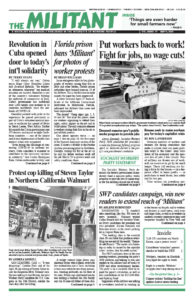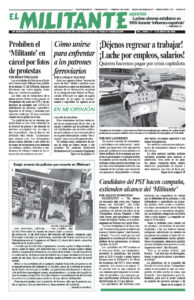Working people in the U.S. colony of Puerto Rico are being kept under lockdown orders stricter than anywhere in the U.S. These include a 7 p.m. to 5 a.m. curfew; rules that those not working in “essential” businesses must stay at home, unless they’re going to the grocery store or pharmacy; and threats against freedom of the press, all imposed by executive orders from Gov. Wanda Vázquez. Mandated plant, store and other closings have thrown more than 130,000 people out of work.
Supermarkets and pharmacies can’t open on Sundays. At first, tire repair and auto mechanic shops were ordered to shut down except on Wednesdays and Thursdays from 9 a.m. to noon.
“The people who make these rules have never gotten their hands dirty. They have no idea what it takes to fix a car,” José Figueroa, president of the Yabucoa Fishermen’s Association, told the Militant April 16 from Puerto Nuevo. After an outcry, Governor Vázquez modified her diktat to allow the car and tire shops to open for eight hours on those two days.
During the Easter weekend the governor ordered all stores closed for three days and even banned commercial fishing during that time. “A lot of commercial fishermen don’t have any other income,” Figueroa noted. “Often they go out in their boat alone. The rule made no sense.”
If the shutdown of the economy and the curfew continues, “it’s going to be a serious problem,” he said. “Small businessmen employ a lot of people. The hotels are shut down. People need to work.”
More than 650 people have been arrested in Puerto Rico since March 15 for violating the curfew. Over 1,600 have been given tickets requiring them to appear in court, where they face punishment of up to six months in jail and fines of $5,000.
Vázquez has imposed other restrictions on democratic rights. She decreed that only “immediate family” is allowed inside any home. And it’s unclear what she means by “immediate.” Media that transmit what the government claims is “false information with the intention of creating confusion, panic, or public hysteria” can face criminal charges.
“There has been more police harassment,” Rosalina Abreu said by phone April 17. Abreu is president of Arecma, a community group in Humacao.
After suspending classes, the government did nothing to get food to children who depend on meals at school. “We’ve organized to distribute food to those who need it,” Abreu said, including by going to the schools to get food that was just left sitting there.
The Puerto Rico chapter of the American Civil Liberties Union challenged the curfew and other undemocratic measures by the governor, including the ban on anyone but immediate family from sharing a home. The Puerto Rican Supreme Court threw the case out, claiming the ACLU and other plaintiffs had not shown they had been personally harmed.
Meanwhile, Natalie Jaresko, executive director of the Fiscal Oversight and Financial Management Board, appointed to direct the Puerto Rican government’s budget by Barack Obama and kept on by President Donald Trump, reminded Vázquez that the most powerful boss on the island is Washington. She wrote the governor April 8 that the board “reserves all its rights to nullify and enjoin” any law or government decision it disagrees with, and to insist that more cuts in government programs and spending must be adopted.
The coronavirus pandemic could have one unanticipated side effect — increasing the size and potential power of the industrial working class in Puerto Rico. Worried about dependency on Chinese manufacturers and global supply chains, some pharmaceutical bosses are considering shifting more production to the island. Puerto Rico is already a center for drug and medical equipment production, with more than three dozen factories exploiting some 90,000 workers.
Adamaris Cruz is a temporary worker at a medical device plant. “I just make the federal minimum. We don’t get health care or any of the benefits,” she told the Militant. “But even a lot of the regular workers only get $7.25.” Pharmaceutical workers have been talking for some time about the need for a union to fight for better wages and conditions, she said.

